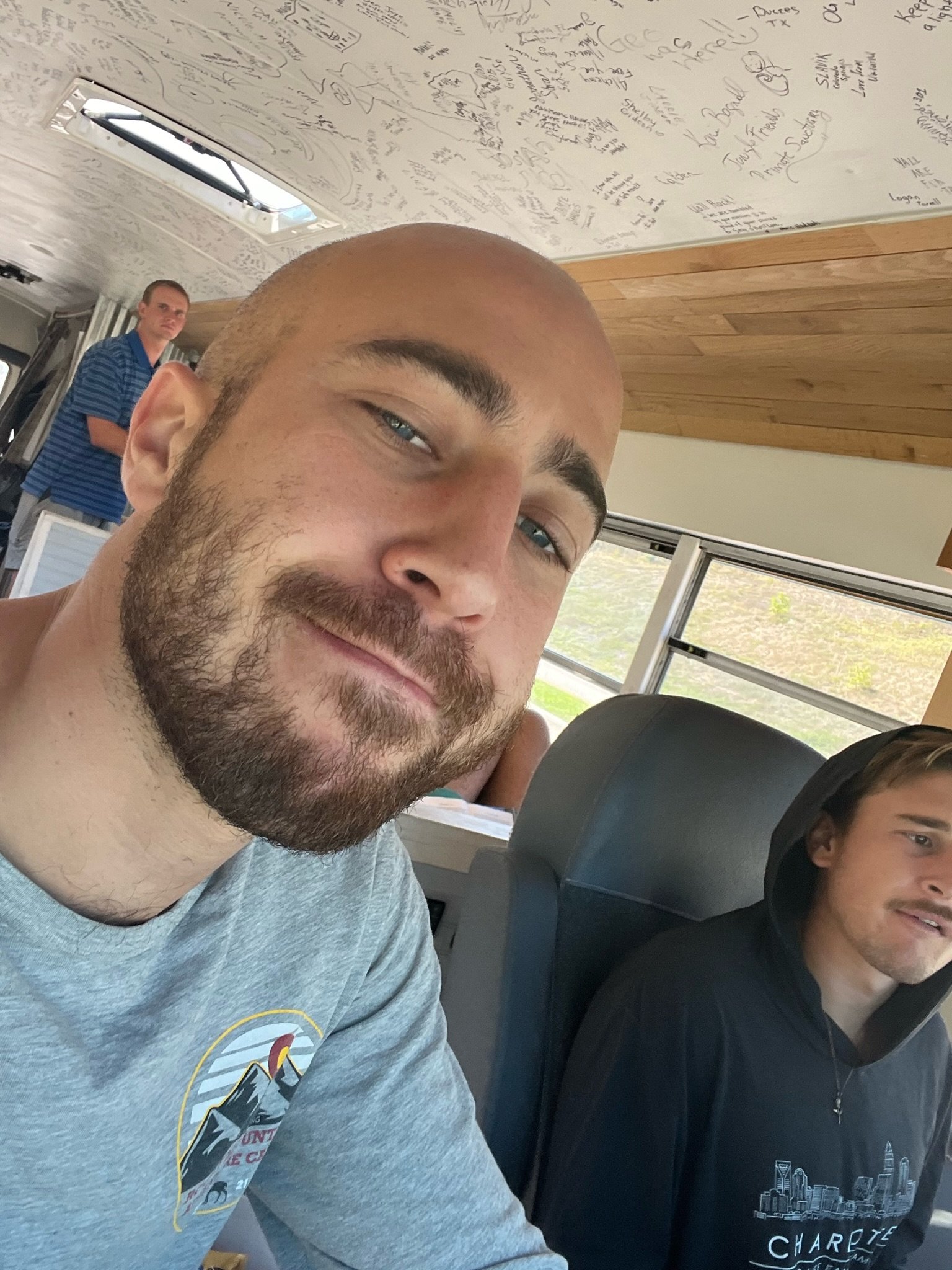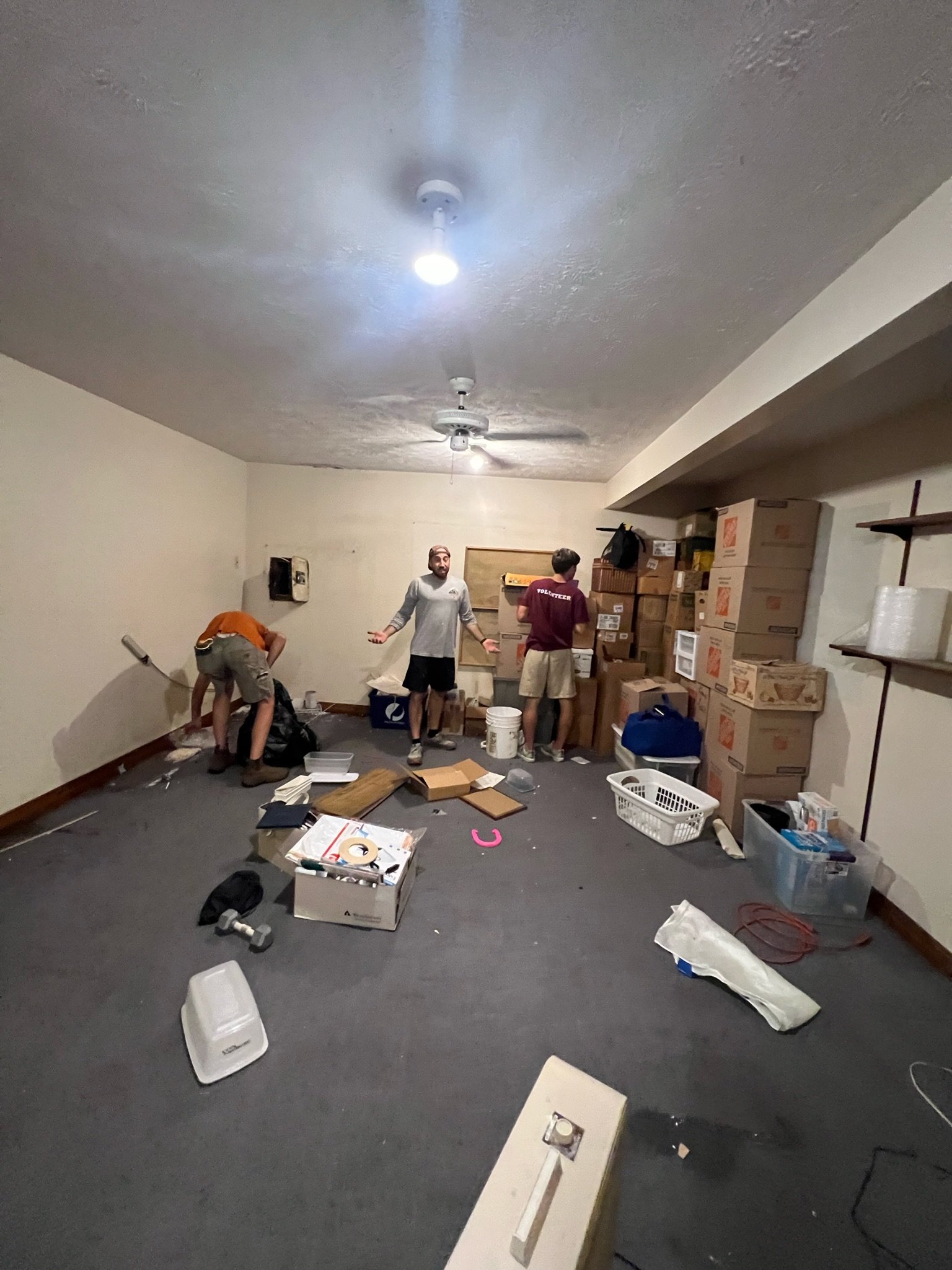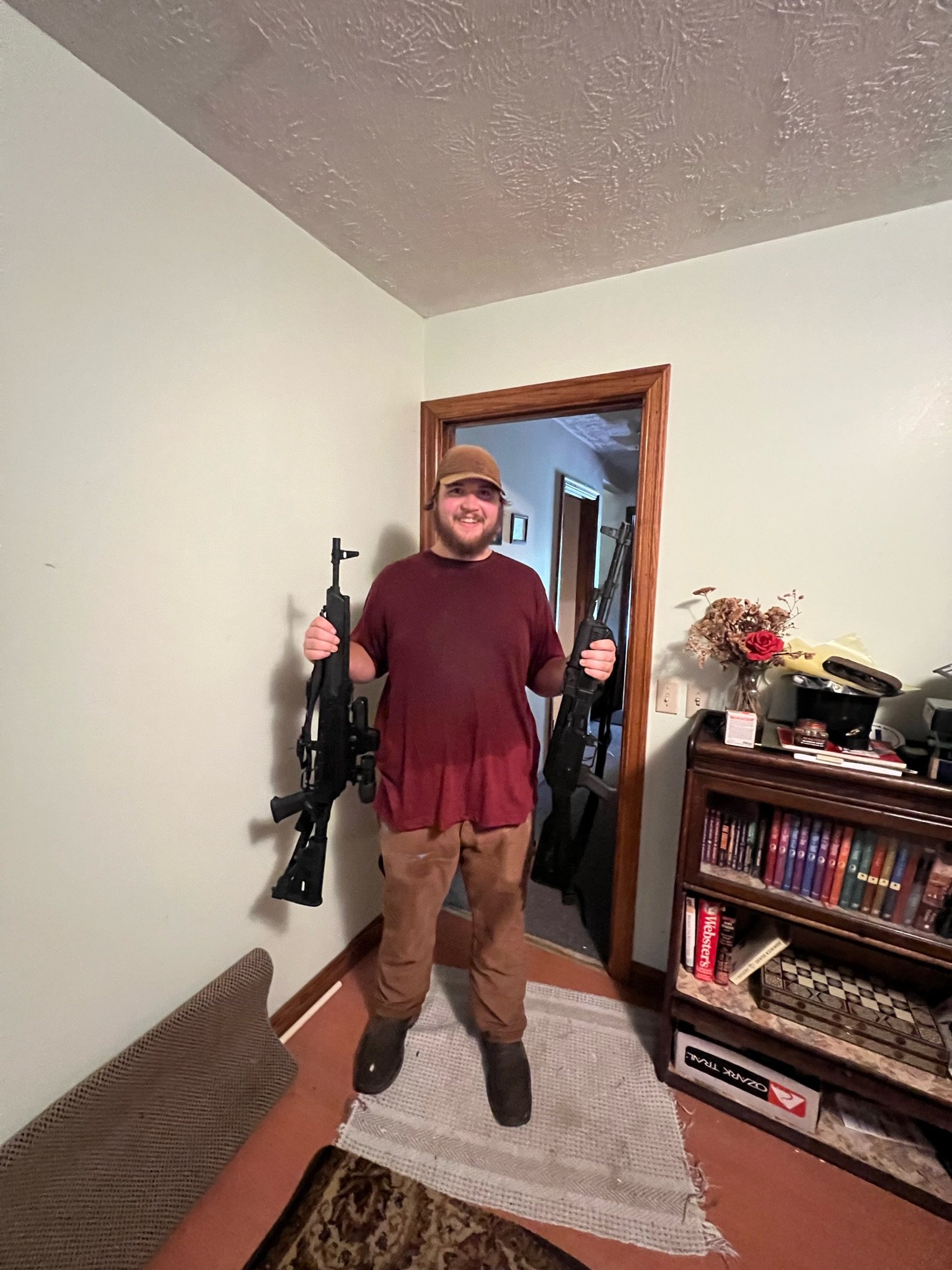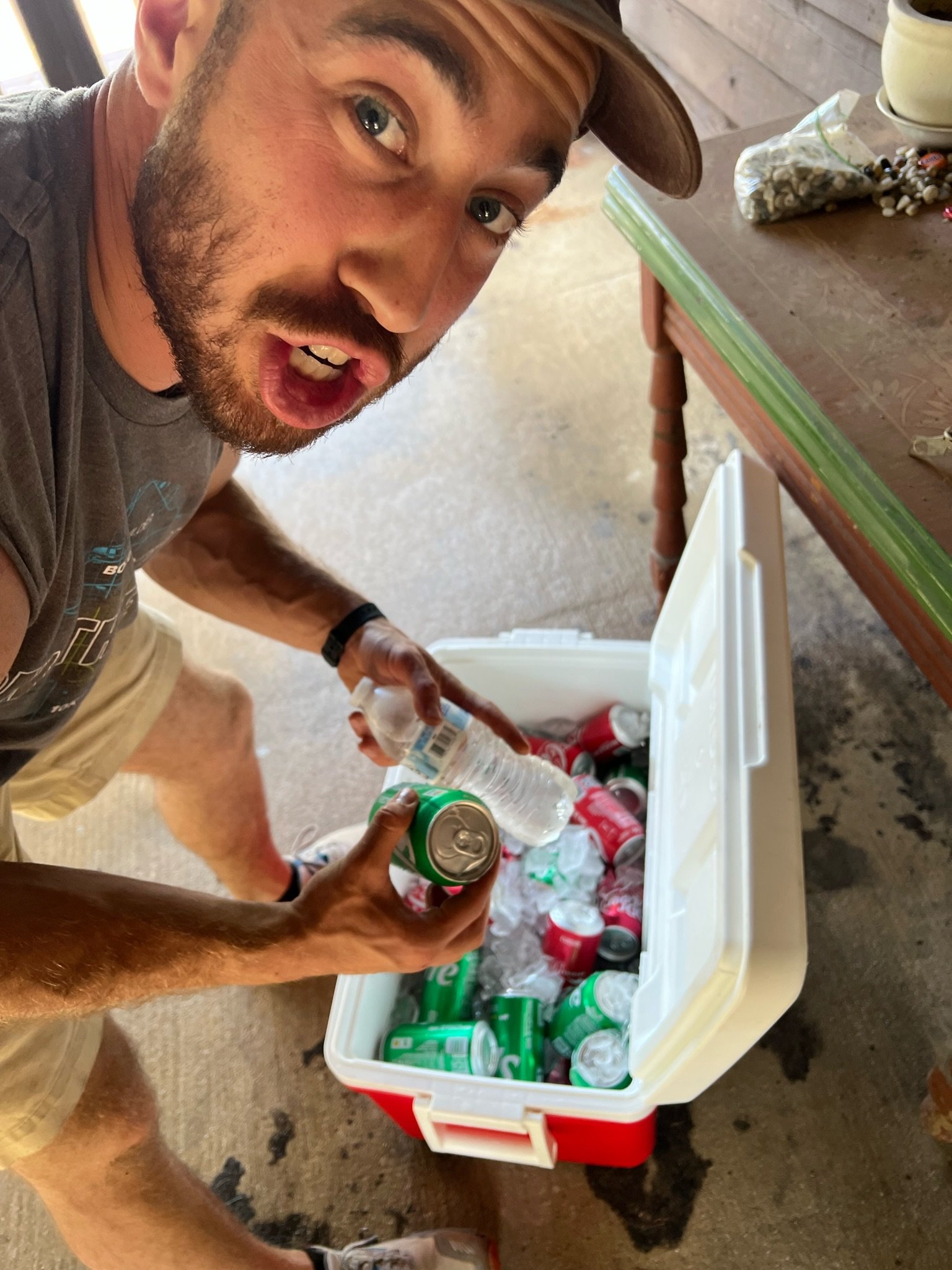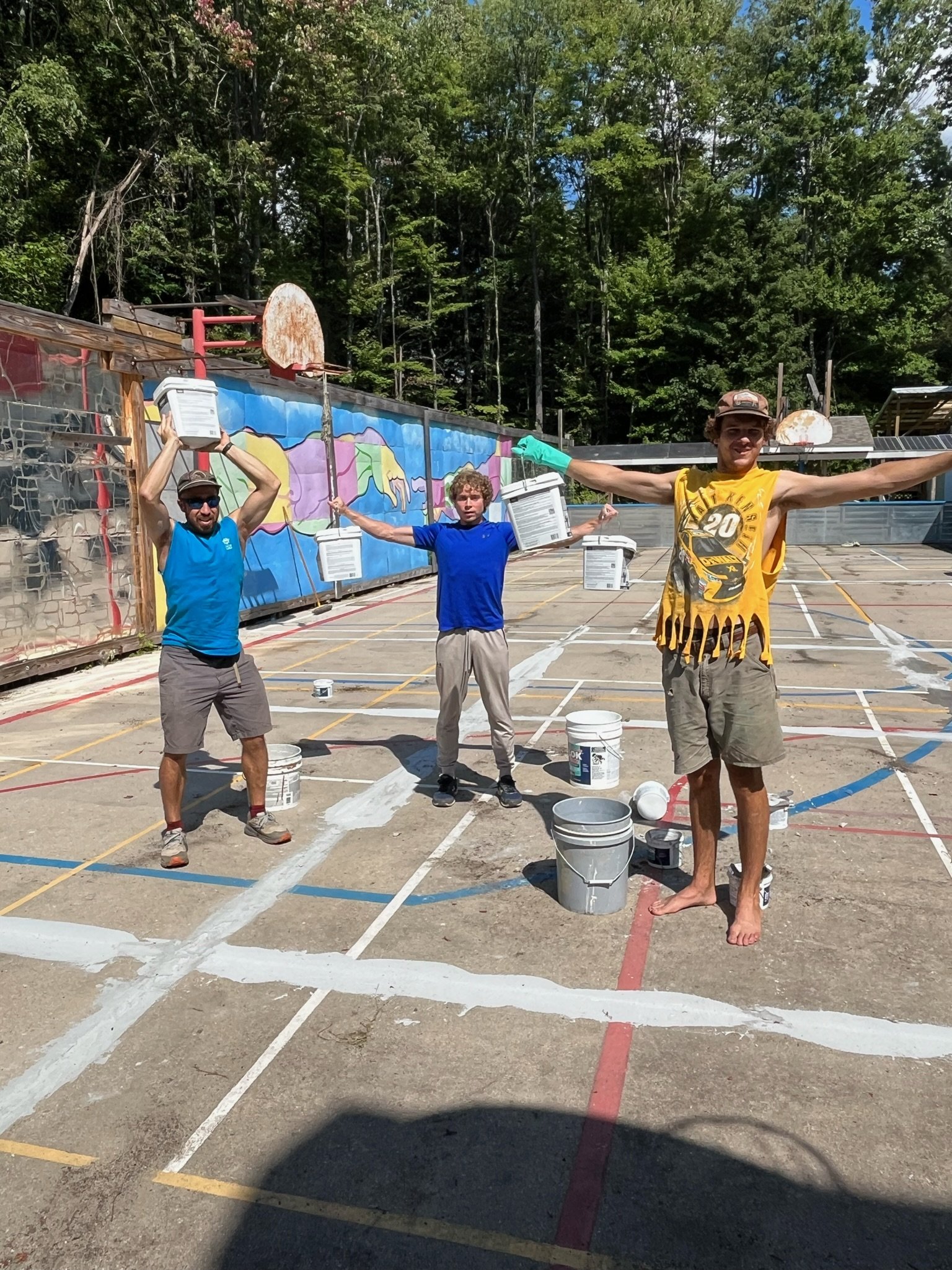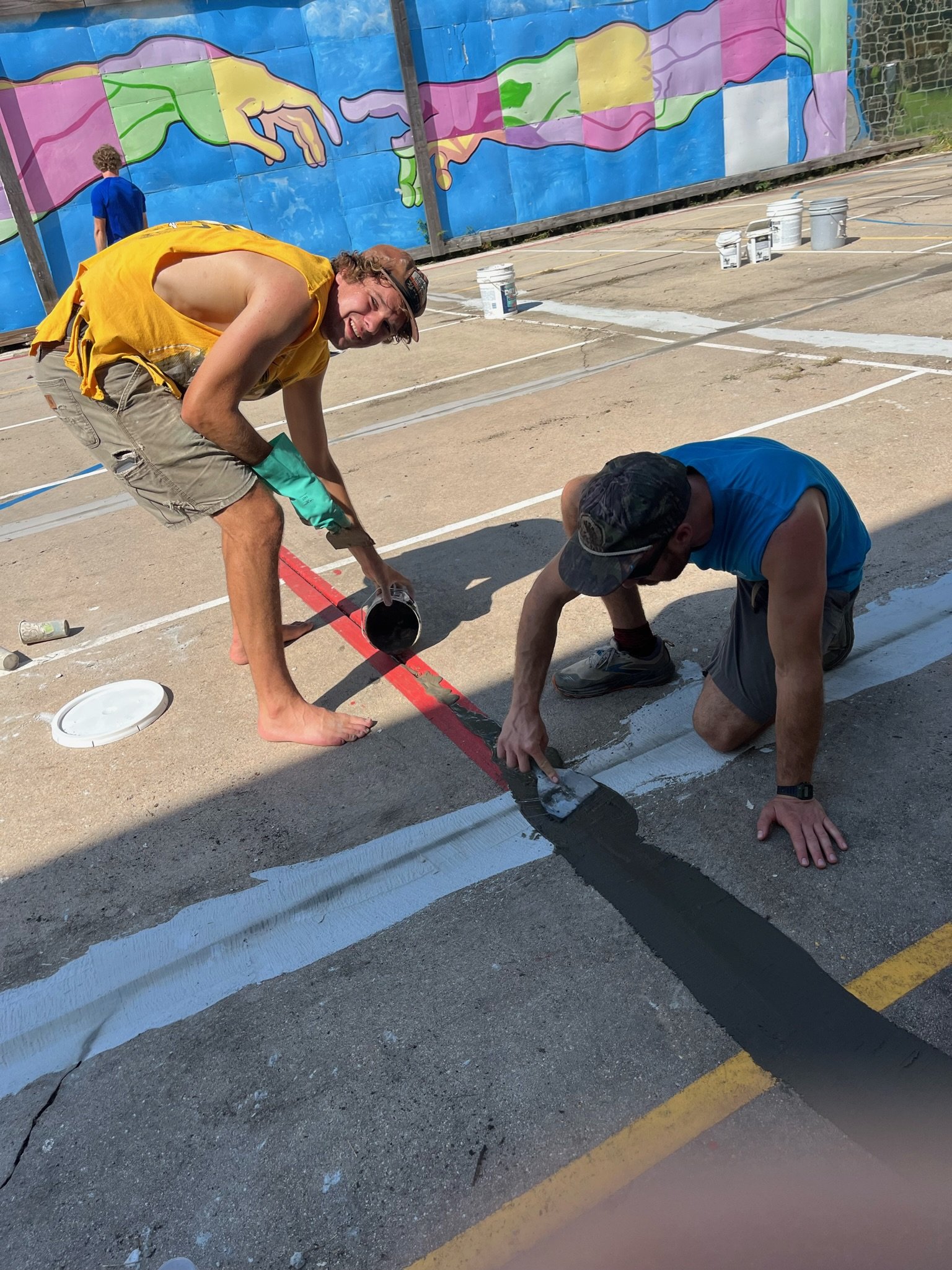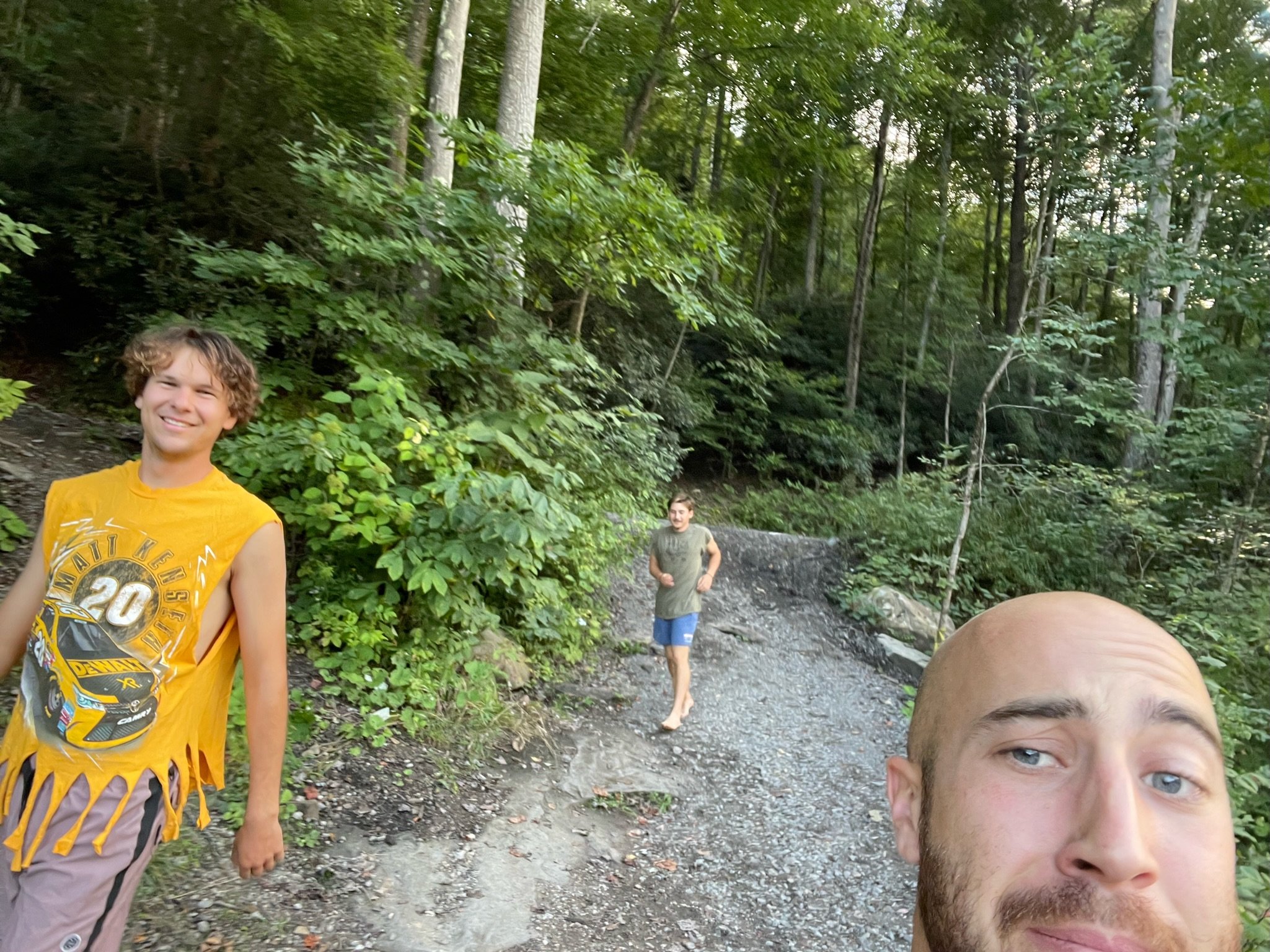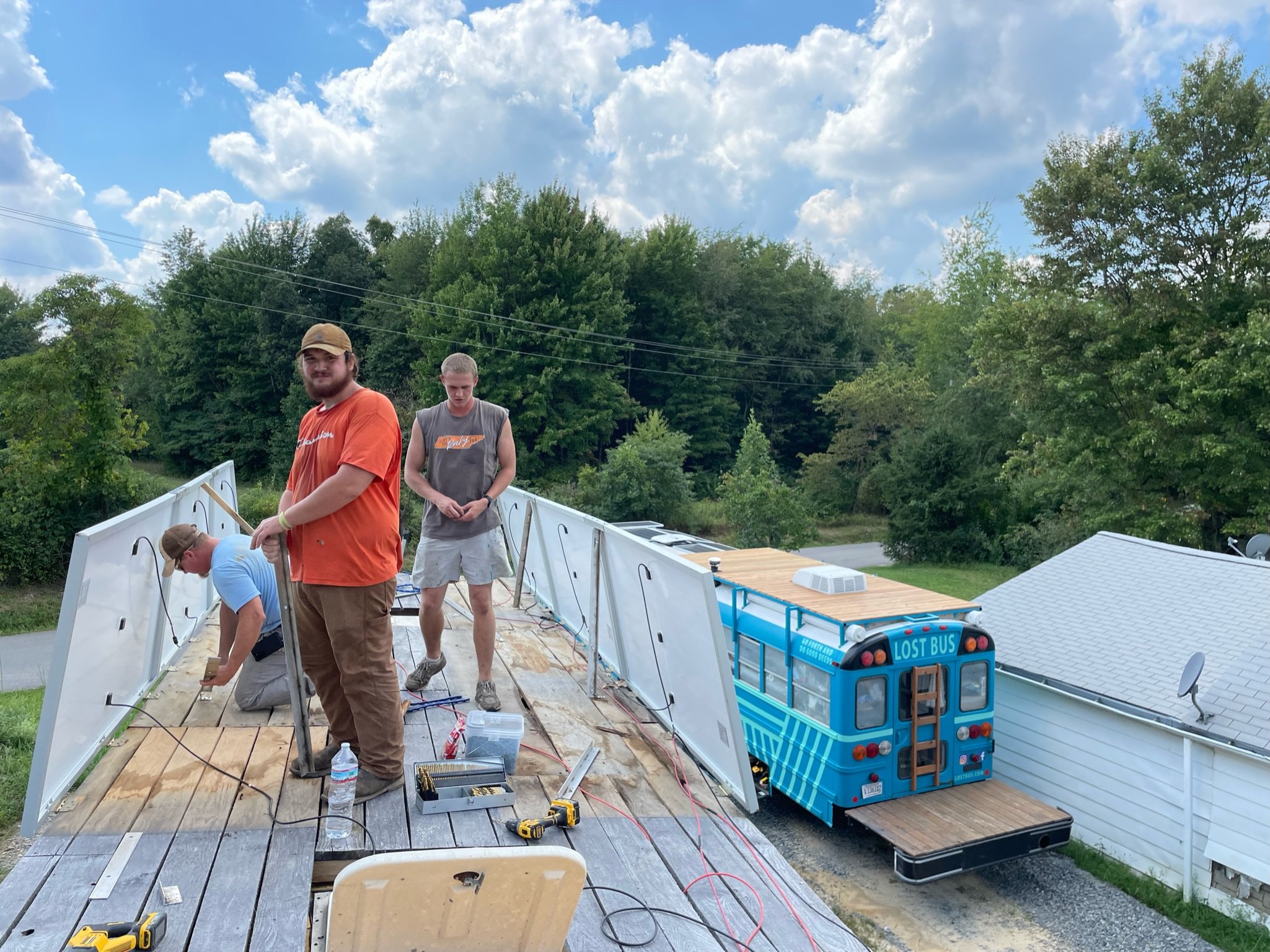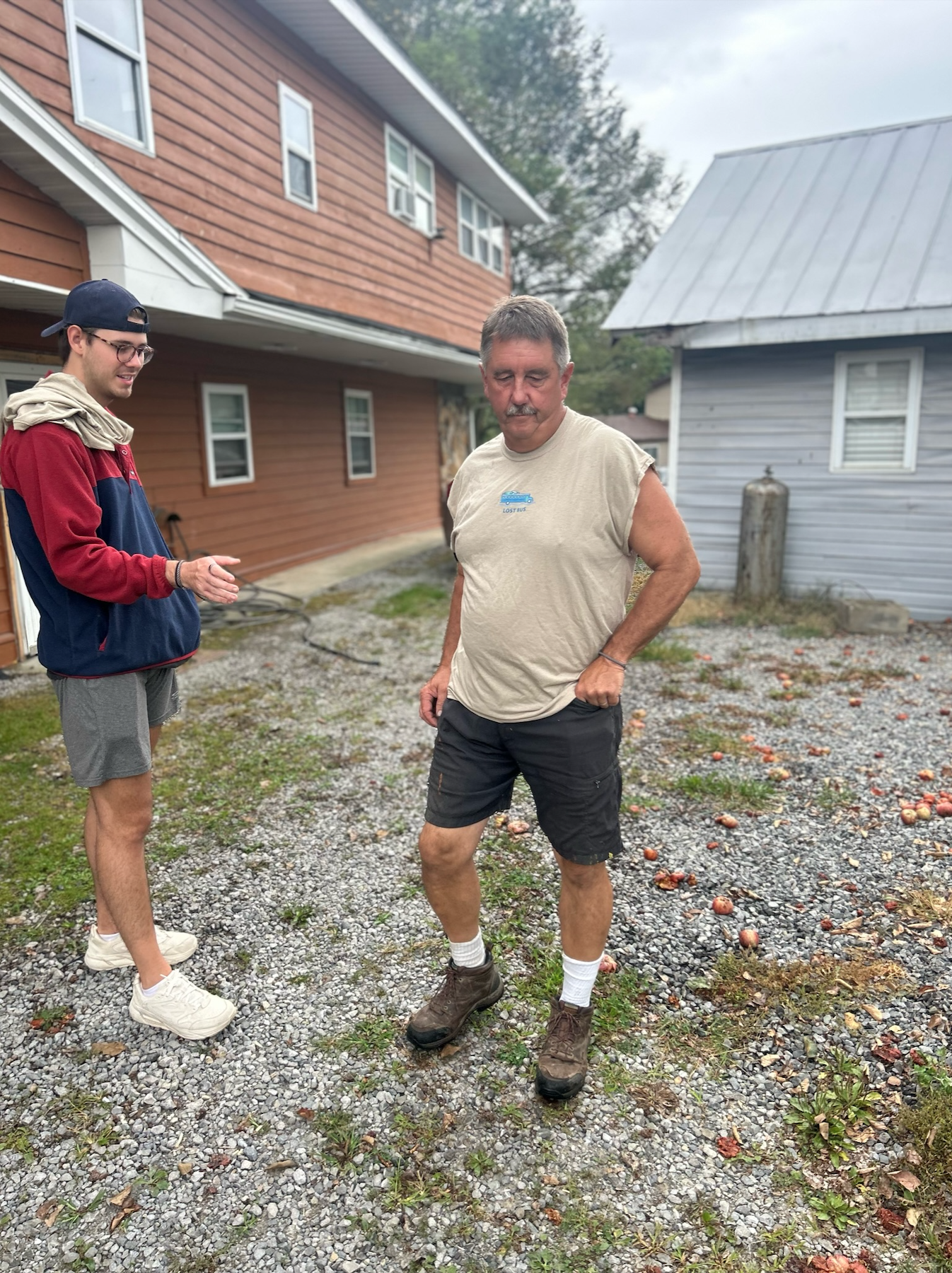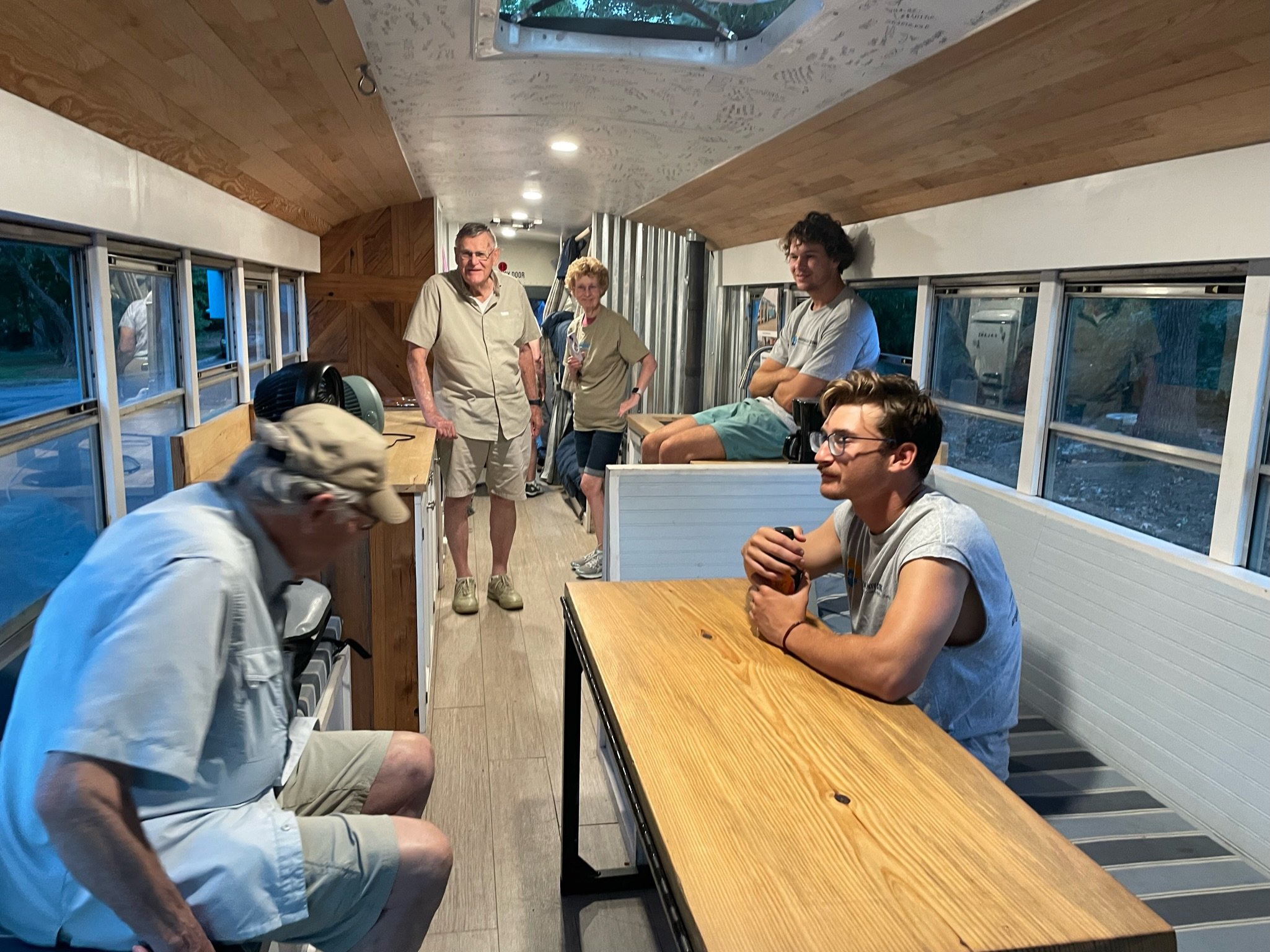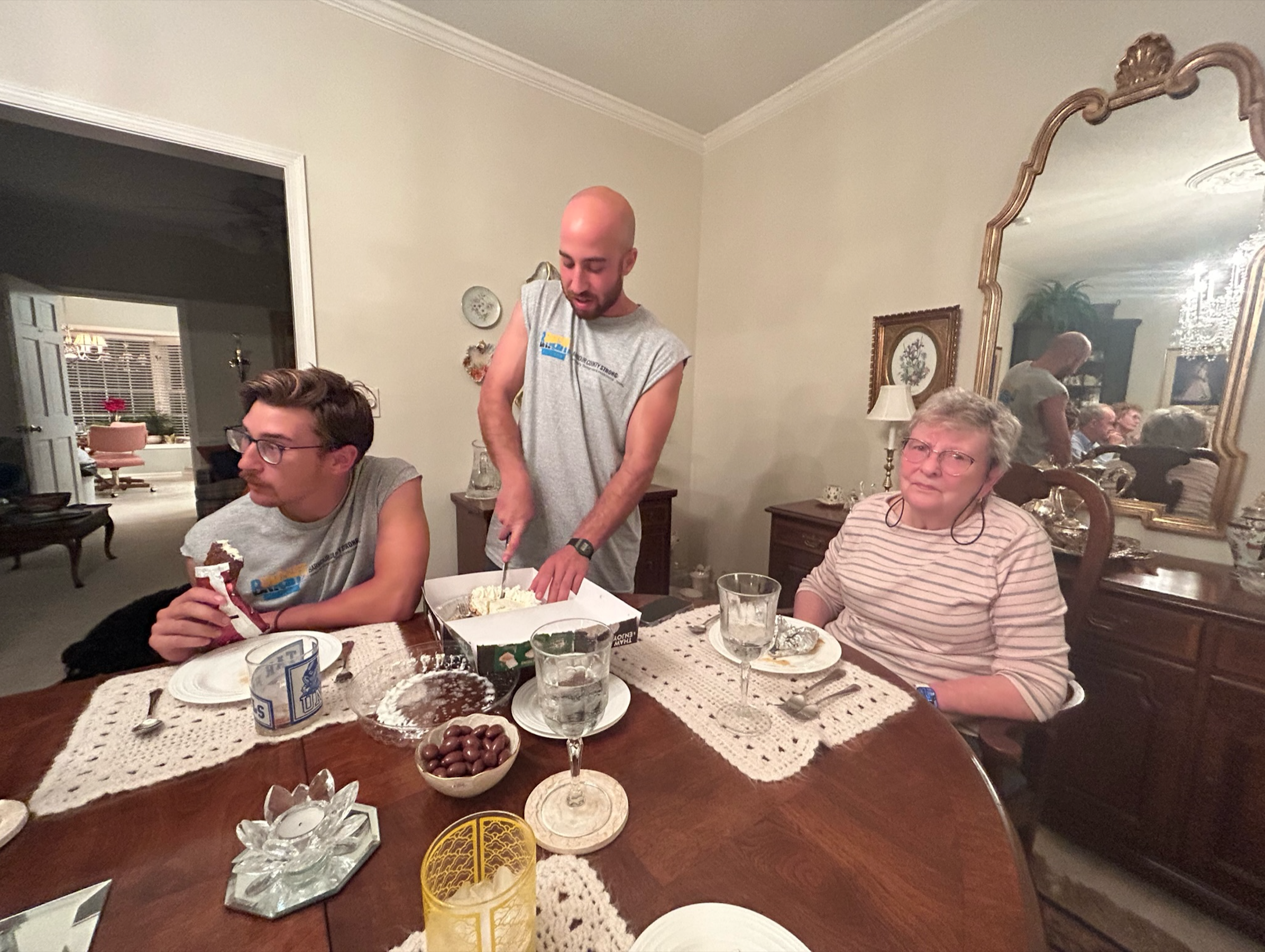Week 48 - Take me Home Country Roads
Our streak of visitors continued this week as Josh’s brother Davey joined us in Philippi, West Virginia. Being a Haddad, it is no surprise that Davey is a man of utmost character; he is intentional, introspective, and a master at making others feel known. In the relatively short time I have known Davey (a year or two), I have come to regard him as a brother of my own, and having him work alongside us this week was a true blessing.
Davey and Josh in their cut off T-shirts (we wore a lot of cut offs this week)
Coming from Colorado with its dominating Rocky Mountains, Davey thoroughly enjoyed exploring the lush, green, softly rolling Appalachian mountains of West Virginia. Philippi is a small mountain town of 3,000 people that reflects the general narrative of challenges across the state as a whole. A depressed economy, lack of education, and a high rate of prescription drug use have West Virginia in the midst of an opioid epidemic. They lead the nation in opioid-related overdose deaths and finish last in physical and mental health. Because of this, it is no surprise that West Virginia also has the highest percentage of kids in the foster care system (over 50% of children are not living with their parents). When kids graduate from the foster care system, they face a world with little opportunity. Coal, the largest industry in the state, is not a glamorous lifestyle, and a life in the mines certainly isn’t doing anything to boost the physical and mental health of employees. Currently, 38% of all foster care youth in West Virginia are homeless on their first day as legal adults - most have no permanent family, no bank account, no transportation, and limited prospects for a healthy start in life. As a result, many turn to the opioid epidemic as a means to make a living - 58% of men are in trouble with the law within the first 18 months of exiting the foster system.
On our way to a river bath in the picturesque soft rolling hills of WV
Those that grow up in these circumstances are a breed of Americans that seem to be cut from a different cloth. To survive and "make it out" of the system requires grit, endurance, and self-reliance. The average West Virginian may lack what the rest of the country might consider rudimentary education, but they excel in other fields of knowledge; repurposing "junk" with a functional application, at-home engine repair and maintenance, and guns - not just the hunting kind. Those that manage to make a decent life for themselves feel that they did so through their own strength and sheer willpower, and those that can't make a decent life feel like they are drowning. As a result, nearly everybody in West Virginia has a general distrust for any form of organized authority.
One man in Philippi has dedicated his life to trying to fix the many problems that ravage the community. Ruston Seaman is the president/CEO of New Vision; a non-profit that is taking a holistic approach to revitalizing communities, attacking problems on multiple fronts that are all tied to the cyclical system that plagues West Virginia. Ultimately, Ruston is trying to break the existing wheel that is spinning in reverse and build a new one that will work to help the community. Here is what I mean:
Josh, Ruston, and Davis - you would NOT catch Ruston in sleeves
Ruston uses "Skill Training Grants" to employ staff members that would otherwise be considered unhireable. The grants only help cover so many hours which translates to approximately 6 months worth of work. In that time, Ruston teaches the staff members enough skills and work ethic so they are in a good position to find employment and a better life once the six months run out. During the six months, Ruston uses the staffers to help him on a myriad of other projects he has going on knowing that the quality may lack, but progress is still progress, so he works with what he has and never complains.
The crew of staffers currently working with Ruston
Some of the projects Ruston has going on or dreaming up include:
The Epicenter: an 8,000 square foot Multi-purpose center built by staffers and volunteers that offers an alternative choice for youth in the area to spend their time that is both healthy and alluring. There are 14 unique spaces in the center where a wide variety of skills and activities can be learned and practiced; woodworking, art, robotics, weightlifting, basketball, E-sports, soccer, and volleyball to name a few.
Tiny Home "Factory": New Vision is about to start manufacturing tiny homes which will provide jobs and trade knowledge for members in the community and will provide the housing for the "New Vision Village".
New Vision Village: An important work in progress that will provide housing for newly independent disconnected youth (ages 18-24); especially those who are aging out of the foster care system homeless and unemployed.
New Vision Renewable Energy: This branch of New Vision has been operating since 2009. They manufacture cereal box-sized solar panel light kits that can be sent to third-world countries or war-torn nations. There are one billion people in the world who don’t have access to artificial light, and even a small LED strip can radically change their life. By manufacturing the kits in Philippi, it also provides skill training to locals in soldering, electronics, and renewable energy.
New Vision Renewable Energy is possible, in large part, thanks to one legendary individual, John Prusa. During our time in Philippi, we got to know lots of folks, but very few, if any at all, did I have the opportunity to get to know as personally as I did John. What makes this extraordinary is the fact that John Prusa died nine months ago. In that time, I have no way of knowing how much of the narrative surrounding John has been embroidered with lavish new details or decorative embellishments. I know that when a man of legendary stature dies, he earns the right to posthumous accolades that may not be a to-scale reflection of his actual life, but it is still a reflection - a reflection that shows the important things about the man and what he represented even if blown out of proportion. When it comes to John Prusa, I only know what I heard and what I saw, and based on what I saw, I believe every bit of what I heard - to scale and all.
John was born in communist-controlled Czechoslovakia as the son of a Baptist preacher. Because of their religion, there was little opportunity for John or his family; they were put on a list and would not find employment anywhere. John's father once got arrested for humming or whistling a Christmas song in a public square. Growing up in these circumstances, John grew accustomed to scavenging any "junk" thrown out by others. Taking it apart and putting it back together, he would sometimes salvage the item or find a new function for it to still be usable, but more importantly, he developed a deep understanding of how things work and would use that knowledge later in life as he began his tinkering and inventions. After a few attempts, John escaped from Czechoslovakia and eventually made his way to Philippi, West Virginia. There he started to rebuild his life - he got a good job as an electrical engineer, found a wife, and started his own family. Even as he lived out the American Dream, John didn’t trust the government or any authority that had power over him - a lesson learned from his childhood. More than anything, John wanted assurance in his independence - no powerful or greedy authority would ever control his life again - and so began his journey to energy independence.
At this point in the story, I can tell you first-hand the things I witnessed. You see, John was a board member at new vision and left his home to the non profit when he died. With everything Ruston has going on all the time, he had not yet begun the long process of cleaning out John’s stuff. Knowing that the LOST Bus would be rolling into town soon, that project was shelved for us. Here is what I saw;
Outside the home, John has an impressive solar setup. He uses different types of panels set up at different angles so he can find the most optimal energy-producing combination. He even has a panel hooked up to a machine that tilts to follow the sun over the course of the day. The power meter on the house was spinning rapidly in the wrong direction - meaning he is creating so much power he is actually pumping it back into the grid.
On the side of the house is a passive solar water and air heating system so he has hot water and heated air on demand without burning any fuel.
Passive Solar water and air heating
Under a large deck where the pool used to be is a few thousand gallons of vegetable oil that has been filtered and is ready to use as fuel for any diesel engine. When John died he hadn’t been to a gas station in nearly two decades.
Once we entered the home, there were more discoveries, mainly food. I learned that in 2002 John went on a big dehydrated food kick as we discovered box after box filled with emergency food supplies. The second-largest export of the Prusa household (after dehydrated food) was Rocks. John’s wife was a geology teacher and had the habit of collecting Rocks she found interesting. Not trusting the dollar, he had his own minting operation, melting down as much silver and gold he could get ahold of into uniform ingots. And then we got to the guns. John could have armed a small battalion.
Some of John’s arsenal
As we picked through his home, we unintentionally picked through his life, and in conjunction with the stories Rustin shared with us, I began to feel as if I knew John myself. Rustin recalls that John always had something "highly interesting" to show him whenever he visited, and confirmed that whenever this mad European scientist claimed something was ‘highly interesting”, it always was.
In Rustin’s first attempt at describing John, he said, “John is a combination of MacGyver, Edison, and James Bond”. I couldn’t wrap my head around that description, and he followed it up with a story so good I have to share it.
John was working on an electric car that he believed could get him from West Virginia to Florida without stopping (the car was going to pull a trailer full of batteries to make this possible). He was only about two days from finishing and attempting the journey. Bent over the hood putting the final touches to his work he heard God tell him to “stand up”, and as he straightened out one of the lithium batteries in front of him exploded. When lithium batteries blow they mimic a flamethrower and John was left with third-degree burns all over the front half of his body. At that moment he knew he had roughly 4 minutes before he would pass out. Living alone in the country he flew into action calling 911 immediately and telling the dispatcher, “Don’t talk just listen. I need you to send an ambulance and a fire truck immediately. Next contact the trauma and burn center in Pittsburgh and have them send a helicopter to Philippi”. He then hung up and began to address the problem that lay in front of him. The electric car he was working on was in his garage where lots of other lithium batteries were stored. He knew if he left the car in there his home would burn down, so he moved to get the car out. He started pushing the vehicle out but realized the front tire was chocked, so he removed the chock and pushed the car out of the garage. Now it was right next to his diesel truck filled with vegetable oil fuel - another bomb waiting to happen. John climbed into his truck and drove it to the end of the driveway where he threw it in park, stepped out and passed out. That’s where the EMT found him when they arrived on the scene, and by the time they got him in the ambulance, the Helicopter from Pittsburgh was arriving in Philippi. MacGyver/ Edison/ James Bond (AKA John Prusa) survived the ordeal - how I wish I could have met this icon. (A great news article I found about John).
John Prusa and his wife
We could see John’s impact on many levels throughout the week. On a personal level, Ruston was clearly affected by the loss of his close friend, whom he held in such high regard. When retelling tales of old, Ruston would glow with pride and love as he recalled the character of his friend John. On a community level, John generously leaving his home to New Vision will be yet another resource the nonprofit can use to impact the Philippi community for the better. And on a global level, John’s ingenuity in developing the solar light kits is impacting people's lives all across the world. John is a true representation of what New Vision is all about.
